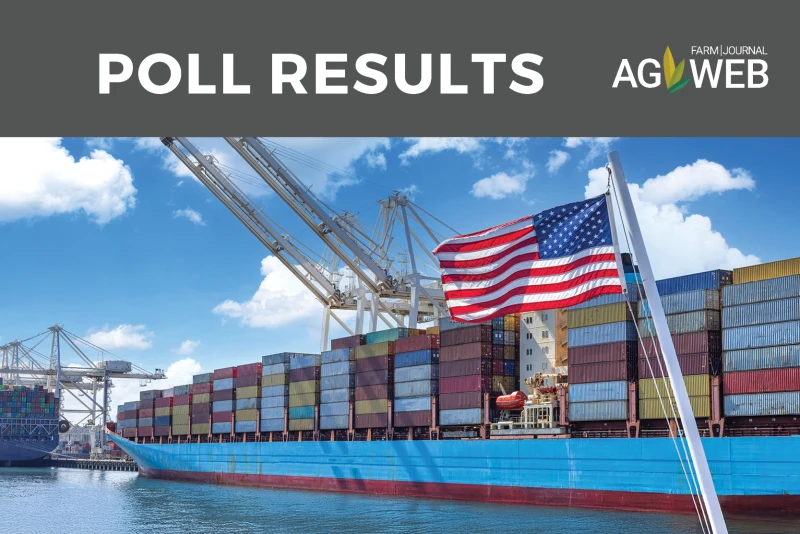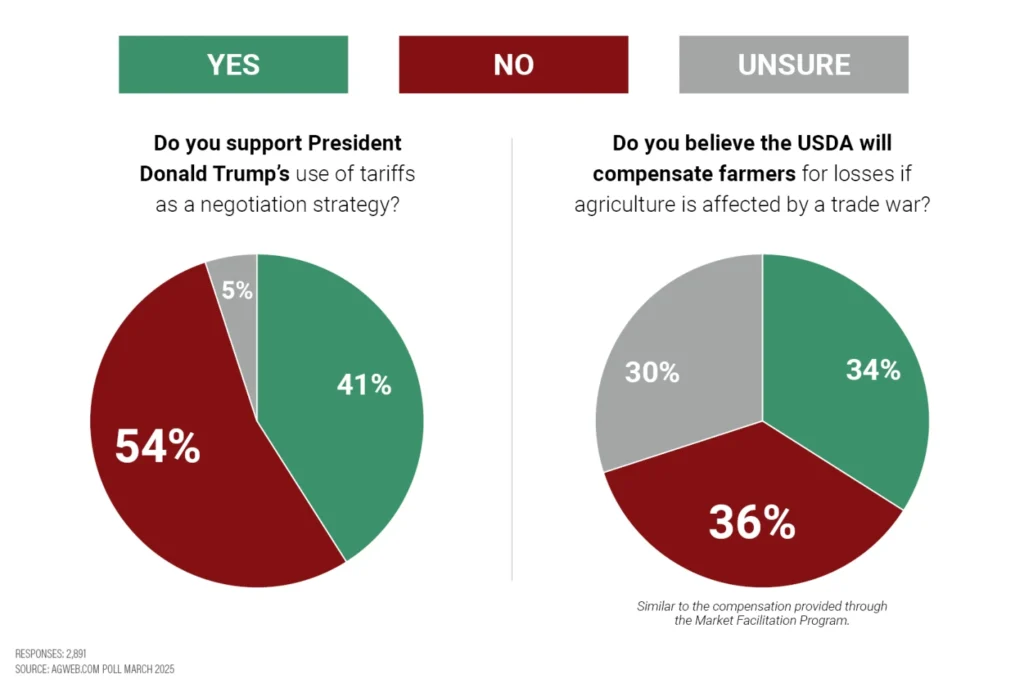With tariffs and trade in focus again, a recent AgWeb poll asked farmers if they support President Donald Trump’s use of tariffs as a negotiating strategy.
March 24, 2025 12:50 PM

The March Ag Economists’ Monthly Monitor found 54% of farmers don’t support the Trump administration’s use of tariffs as a negotiating strategy. (Lori Hayes )
President Donald Trump has been clear since the campaign trail: Tariffs are a tool he would use aggressively during his presidency, and that’s exactly what the president is doing as tariffs have become a bit of a trademark during Trump 2.0 and the first 100 days.
As he prepares to impose more tariffs on April 2, Trump said Monday that he will impose tariffs of 25% on any nation that purchases oil from Venezuela.
“Venezuela has been very hostile to the United States and the freedoms which we espouse. Therefore, any country that purchases oil and/or gas from Venezuela will be forced to pay a tariff of 25% to the United States on any trade they do with our country,” Trump said in a post on Truth Social.
As both targeted and blanket tariffs are applied, retaliatory tariffs on U.S. agriculture are also caught in the middle of the latest trade war. How do farmers feel about this? That’s exactly what we wanted to uncover during the latest AgWeb poll.
The latest AgWeb poll asked, “Do you support President Donald Trump’s use of tariffs as a negotiation strategy?” And even though the majority of farmers say they don’t support Trump’s use of tariffs, according to the recent AgWeb poll, it wasn’t on overwhelming majority.

(AgWeb Poll)
Out of the nearly 3,000 farmers who responded,
- 54% responded “no”
- 41% responded “yes”
The poll then followed-up by asking, “Do you believe USDA will compensate farmers for losses if agriculture is affected by a trade war?”
The responses here were much more mixed.
- 36% responded “no”
- 34% said “yes”
- 30% responded they were “unsure”
What are farmers saying in the field? Michelle Jones, a fourth-generation farmer in south central Montana was asked the question about if she supports Trump’s use of tariffs on “AgriTalk” last week.
“No, definitely not,” Jones said. “I don’t think that tariffs are an effective negotiation strategy, and I also don’t think that we’re truly being surgical in how we are applying them.”
Jones says there are cases in history where tariffs are effective, but she says in the majority of those cases, the tariffs are extremely targeted and apply to a certain industry or specific country.
“They were also very short-term whereas now, we’re just using them as basically a blanket approach and then escalating when the president gets angry, and then he rolls them back, and it creates too much uncertainty. It’s just not wildly effective,” Jones also said on “AgriTalk.”
“I agree, they were used before the Phase One deal with China, and they were never dealt with under the Biden administration either,” added April Hemmes, an Iowa farmer, who was also on “AgriTalk” last week. “Now all we’ve done is piss off our neighbors with this, the Canadians, bringing Canada and Mexico into it. And now all consumers are going to have to pay up, not just the farmers.”
However, there are some farmers and those in agriculture who support the president’s heavy use of tariffs. One of those is Bubba Horwitz of Bubba Trading, who focuses on the commodity markets.
“I think it’s a great tool to use,” Horwitz said on “AgriTalk.” “I think you’ve seen it with Canada and Mexico to get things that he wanted to get done. And certainly, you can bargain with those tariffs, you can do whatever you want. I think it’s a great negotiating tool, and it certainly can put pressure because remember one thing, the United States of America could stand alone. We could be an island without anybody. We don’t need anybody else to survive, whereas other countries and nations do need us to survive. We could be totally an island and exist perfectly well without the help of any other country in the world.”
Secretary Rollins Defends Trump’s Use of Tariffs
During a recent interview with Fox News’ Maria Bartiromo, Agriculture Secretary Brooke Rollins defended the president’s use of tariffs, also saying he’s holding Canada accountable.
“This president’s vision of tariffs being such an important part of his toolkit, as he begins to realign the economy to put America first, to put our men and women, our families first. Everybody knows, and when they voted in November of 2024, they knew that’s what they were voting for. And so as we see the president begin to roll out, as we see him hold accountable Canada with their 250 % tariffs on our dairy products, as they see him hold accountable, Mexico, China, all these countries where we have a 5 % on our end when our products go out. They’ve got 15 %,so three times, this is on average on their end when their products come in. It’s not fair. And it’s got to be equalized as we move toward more free trade,” said Rollins.
Rollins pointed out the president has been very clear that there will be an interim period where the economy readjusts.
“Real transformation takes these harder decisions. And no one’s willing to do that, except now President Trump is,” Rollins said during the interview. “So obviously 100 % behind it, I am talking to farmers every single day. They know that the president has their back. They know and are prepared for potentially, you know, an interim period as we move toward what the president has said is the greatest age of prosperity not just for all Americans, But for our farmers in our ranchers as well.”
Ag Economists are Concerned About Tariffs and Impact Long Term
Farm Journal asked a similar question regarding using tariffs to negotiate in the March Ag Economists’ Monthly Monitor, and the survey found an overwhelming majority of economists are concerned about the impacts long term.
Ninety-two percent of economists think Trump’s strategy of using tariffs as a negotiating tool won’t benefit U.S. agriculture in the long run.
- “Lost trade and lost reliability in a key sector for aggregate ag demand will hurt agriculture more than any specific market gains made from negotiations or reciprocal trade battles,” one economist said.
- “Tariffs not only have a negative impact the short run, they also have negative impacts in the long run,” said an economist in the anonymous survey.
- “Lost market share is extremely difficult to regain, especially when the U.S. becomes known as an unreliable market partner,” another economist noted.
- “I responded yes, although I believe there are scenarios where this is harmful and scenarios where it could be beneficial,” said another economist. “For it to be beneficial depends on it being short lived and resulting in trade initiatives with market access or purchase commitments. And in the meantime, action is taken quickly related to President Trump’s post to offset trade loss with increased domestic use such as removing dated rules that limit ethanol blends, renewing or creating biofuels production incentives, and adding SAF as a mandated fuel.”
Market Facilitation Program 2.0?
If agriculture is caught in the middle of another trade war, the March Ag Economists’ Monthly Monitor wanted to know if economists think USDA will compensate farmers for their losses again, similar to what the previous Trump administration did with Market Facilitation Program (MFP) payments.
Even though Secretary of Agriculture Brooke Rollins has promised to make farmers whole through another trade war, economists are concerned about available funding.
Seventy-seven percent of economists think USDA will compensate farmers, but 23% don’t think so.
Here’s what economists in the March Ag Economists’ Monthly Monitor had to say.
- “Congress might be the limiting factor,” one economist said.
- “They will want to do so, but their ability to do so may be limited. The failure to include replenishment of the Commodity Credit Corporation’s borrowing authority in the continuing resolution limits available CCC funds, and other options may also be limited in potential scope,” another respondent shared.
- “Yes, I expect more trade compensation because of the political sensitivity of ag and the administrative commitments already to doing so. I don’t know what and how much it might be, particularly if we are entering a new era of budget austerity or at least stated goals of budget restraint,” responded one economist.
- “Depends on who is calling the shots Trump or Musk,” another economist noted. “Trump might want to because farmers voted for him. But will he spend the money? He probably would. But, who else are farmers going to vote for? Is Trump running again?”
- “Tariffs are not good revenue creators — they are a poorly targeted tax on U.S. consumers. If the federal government believes it will raise revenue from these tariffs like it claims, it is hard for me to believe that they will turn around and give that limited revenue back to the people it impacted the most,” said an economist in the anonymous survey.
No matter what happens with the upcoming April 2 tariff deadline, economists agree that what happens with trade and tariffs will likely be the top factor that impacts agriculture over the next 12 months.
In a recent interview on “AgriTalk,” hear where Sen. Chuck Grassley, R-Iowa, stands on fair trade versus free trade.
Story here: https://www.agweb.com/news/policy/politics/poll-results-more-half-u-s-farmers-say-they-dont-support-trumps-use-tariffs